Introduction: Exploring the Intersection of Reishi and Modern Cancer Research
In recent years, the growing interest in natural health solutions has brought ancient remedies back into the spotlight, particularly those deeply rooted in Traditional Chinese Medicine (TCM). One such remedy, revered for centuries, is the reishi mushroom, known scientifically as Ganoderma lucidum and often referred to as “lingzhi” in TCM literature. Modern scientific inquiry, particularly through numerous reishi mushroom cancer study investigations, is beginning to validate and explore the traditional claims surrounding this fascinating fungus. As research delves deeper, questions about the connection between lingzhi mushroom and cancer prevention or support treatments have moved from folklore into evidence-based discussions.
You may also like: How Lion’s Mane Supplements May Support ADHD and Cognitive Clarity: What Science Says About Lions Mane for Focus and Brain Health
In this article, we will journey through the evolving landscape of scientific findings about ganoderma mushroom cancer research, investigating what contemporary studies reveal about reishi’s potential role in supporting cancer therapies. We will also examine the broader context of reishi TCM traditions, highlighting how ancient wisdom and modern medicine may converge in the future of integrative oncology. Through a blend of historical insight, modern evidence, and practical considerations, this exploration aims to illuminate both the promise and limitations of reishi as part of holistic cancer support.
The Historical Role of Reishi in Traditional Chinese Medicine
Reishi’s history in TCM is not simply a matter of anecdotal reverence; it is embedded deeply in the philosophical and medical traditions that shape Eastern health practices. Referred to as the “Mushroom of Immortality,” reishi was prized for its perceived ability to enhance longevity, vitality, and spiritual strength. In classical TCM texts, lingzhi is associated with balancing Qi (vital energy), nourishing the heart, calming the spirit, and strengthening the body’s resistance to disease.
The concept of reishi TCM views health as the result of harmony among the body’s internal systems and between the individual and the environment. When disruptions occur, illness can follow. Within this framework, reishi is employed as an adaptogen—an agent that helps the body resist various stressors, including physical, chemical, and biological challenges. This adaptogenic property is one reason reishi mushroom cancer study efforts are increasingly interested in the mushroom’s potential to modulate immune responses, enhance resilience, and possibly complement conventional cancer therapies.
Importantly, traditional usage often emphasized prevention rather than cure. Lingzhi mushroom and cancer discussions in ancient times were more about fortifying the body against malignancies rather than treating existing tumors. Today, however, scientific methodologies allow a much more detailed exploration of these possibilities, providing a richer and more nuanced understanding of what reishi might truly offer.
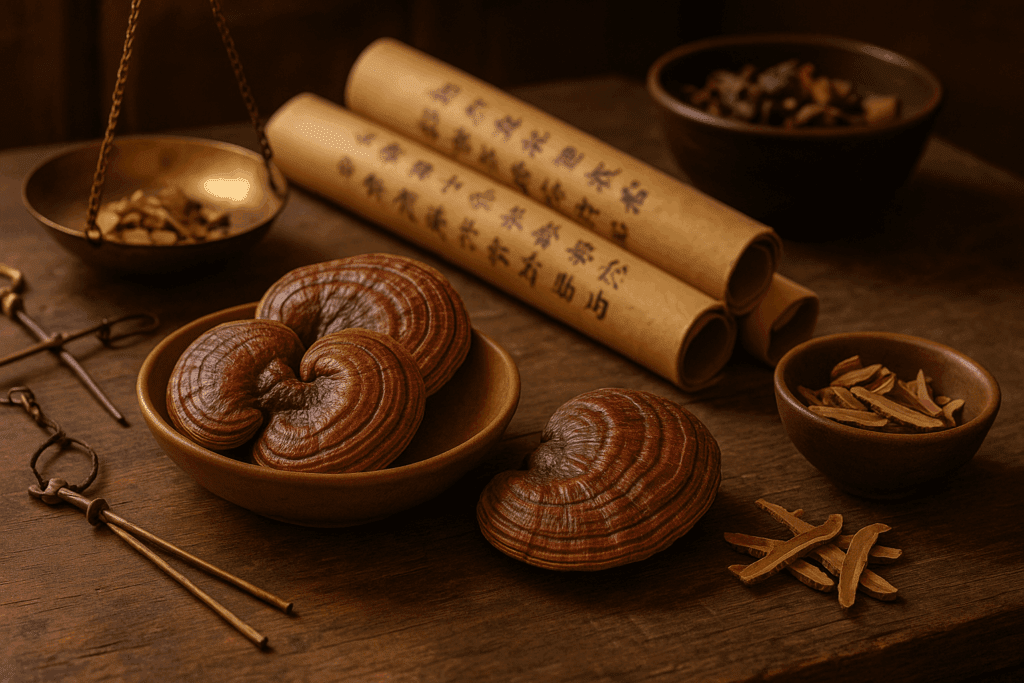
Understanding the Bioactive Compounds in Reishi Relevant to Cancer Support
At the heart of reishi’s therapeutic potential lies a complex array of bioactive compounds. Chief among these are polysaccharides, triterpenoids, peptidoglycans, and various antioxidants. Each of these compounds exhibits distinct biological activities that could play a role in supporting cancer care.
Polysaccharides from reishi, particularly beta-glucans, are of significant interest in ganoderma mushroom cancer research due to their immunomodulatory properties. Beta-glucans are known to activate various immune cells, including macrophages, dendritic cells, and natural killer (NK) cells, all of which are crucial for the body’s defense against tumors. Studies have demonstrated that these polysaccharides can enhance the recognition and destruction of abnormal cells, potentially complementing the effects of standard treatments like chemotherapy and radiation.
Triterpenoids, another critical group of compounds found in reishi, exhibit anti-inflammatory and anti-proliferative properties. Some research suggests that triterpenoids can induce apoptosis (programmed cell death) in certain cancer cell lines, inhibit tumor angiogenesis (the formation of new blood vessels that feed tumors), and reduce metastasis. The dual action of immunomodulation and direct anti-cancer effects provides a scientific basis for continued reishi mushroom cancer study endeavors.
Furthermore, the antioxidant components of reishi help reduce oxidative stress, a factor implicated in the development and progression of cancer. By mitigating oxidative damage to DNA and cellular structures, reishi may offer additional protective benefits, aligning with the traditional emphasis on preventive health.
Key Findings from Reishi Mushroom Cancer Studies
Over the past two decades, a growing body of clinical and preclinical studies has sought to explore how lingzhi mushroom and cancer outcomes might be connected. While much of the evidence remains preliminary, several consistent findings have emerged that warrant attention.
In vitro studies have shown that reishi extracts can inhibit the proliferation of various cancer cell lines, including breast, prostate, lung, and colorectal cancers. These findings suggest that reishi may possess broad-spectrum anti-tumor properties. Moreover, some animal studies have reported that reishi supplementation can slow tumor growth and enhance survival rates, particularly when used alongside conventional therapies.
Clinical trials, although limited in number and size, provide some encouraging insights. For example, a randomized controlled trial published in the Journal of Oncology found that patients with advanced lung cancer who received reishi extract alongside standard chemotherapy experienced improved immune parameters, such as higher NK cell activity and increased interleukin-2 levels, compared to those receiving chemotherapy alone. These immune enhancements were associated with better overall quality of life, though not necessarily with extended survival times.
Importantly, while reishi mushroom cancer study results are promising, they often emphasize the need for caution. Reishi is typically seen as an adjunct rather than a replacement for established cancer treatments. Researchers consistently call for larger, well-designed clinical trials to confirm efficacy, determine optimal dosages, and identify which patient populations might benefit most.
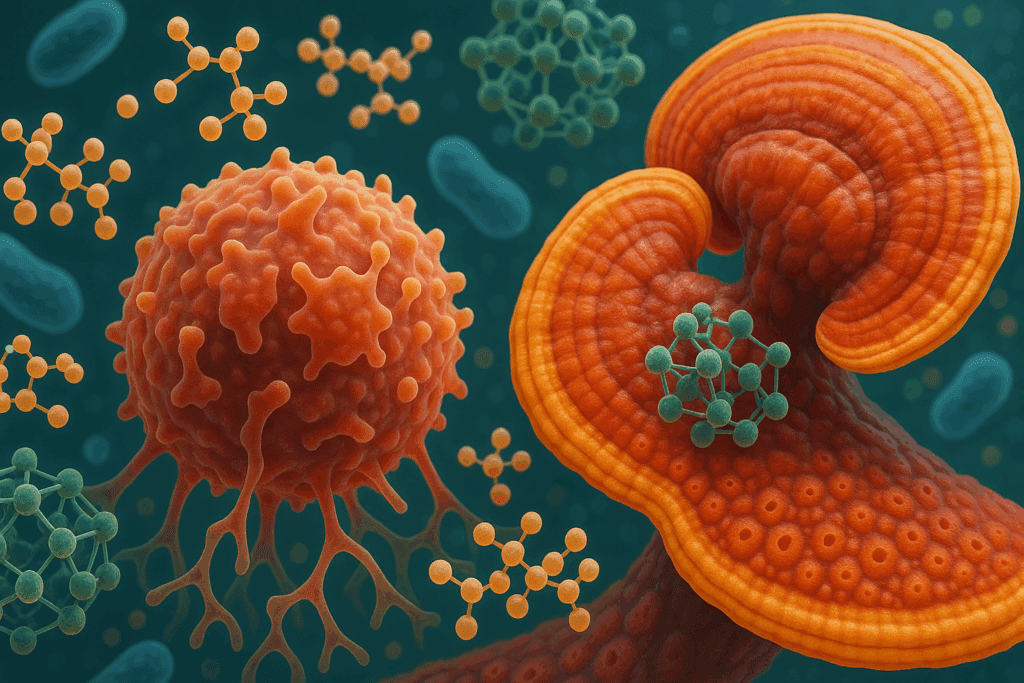
How Reishi Modulates the Immune System to Support Cancer Therapies
One of the most compelling areas of reishi mushroom cancer study research lies in its immunomodulatory capabilities. Cancer is not merely a disease of unchecked cell growth; it also involves the failure of the immune system to recognize and destroy malignant cells. Therefore, therapies that bolster immune function are of tremendous interest.
Ganoderma mushroom cancer investigations reveal that reishi can enhance both innate and adaptive immunity. Beta-glucans stimulate macrophages and dendritic cells, increasing antigen presentation and promoting the activation of T-cells. These T-cells, in turn, can target and eliminate cancer cells more effectively. Moreover, reishi has been shown to boost the activity of NK cells, which are particularly adept at detecting and destroying abnormal cells without prior sensitization.
In addition to enhancing immune attack mechanisms, reishi may help modulate immune checkpoints, potentially reducing the ability of tumors to evade detection. Some studies suggest that reishi components can downregulate immunosuppressive pathways, such as PD-1/PD-L1 interactions, although more research is needed to confirm these effects in human subjects.
Interestingly, reishi’s immunomodulatory effects are often described as “balancing” rather than merely stimulating. This means that reishi can help enhance underactive immune responses while simultaneously calming overactive, inflammatory processes. Such balance is crucial in cancer therapy, where chronic inflammation can paradoxically promote tumor growth.
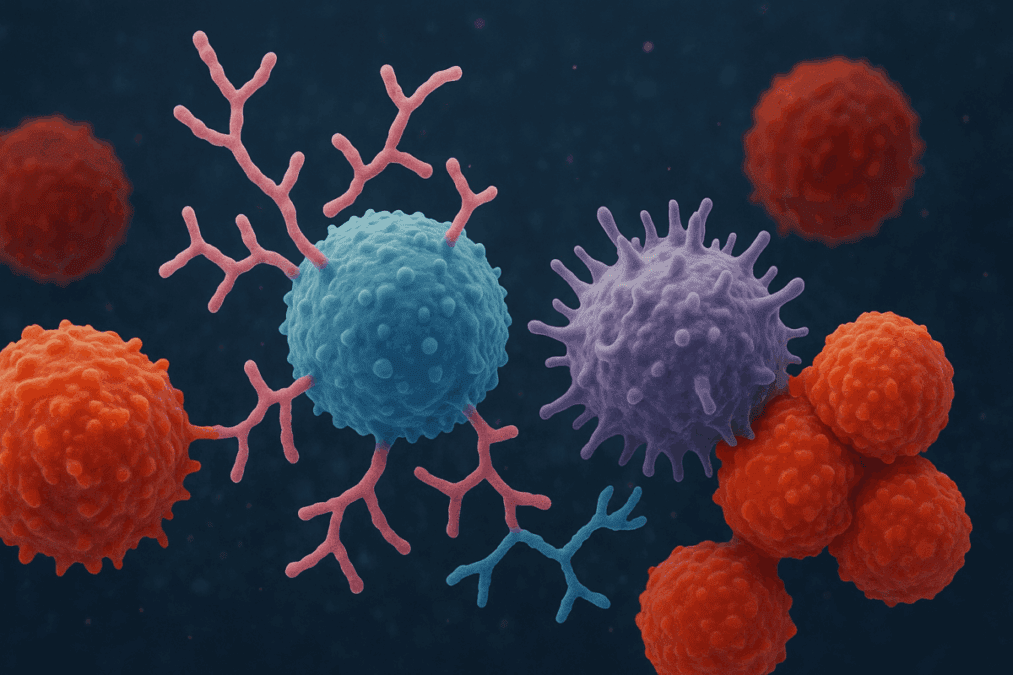
Potential Synergies Between Reishi and Conventional Cancer Treatments
Another promising aspect of lingzhi mushroom and cancer research involves potential synergies between reishi and conventional treatments like chemotherapy, radiation, and immunotherapy. Several studies suggest that reishi may enhance the efficacy of these treatments while mitigating some of their side effects.
Chemotherapy and radiation therapy, while powerful, often damage healthy cells and suppress immune function. Reishi’s antioxidant properties may help protect normal tissues from oxidative damage, potentially reducing side effects such as fatigue, nausea, and infections. In addition, its immune-enhancing effects could counteract the immunosuppression commonly associated with these therapies.
Emerging research also hints at the possibility that reishi may increase the sensitivity of cancer cells to chemotherapy agents, making them more susceptible to treatment. For example, some studies have found that reishi extracts can sensitize tumor cells to cisplatin, a commonly used chemotherapy drug, possibly through mechanisms involving oxidative stress modulation and apoptotic pathway activation.
Nevertheless, while the potential for synergy is exciting, it is essential to approach such combinations with caution. Patients should always consult their oncology team before adding reishi or any supplement to their treatment regimen to avoid potential interactions or unintended effects.
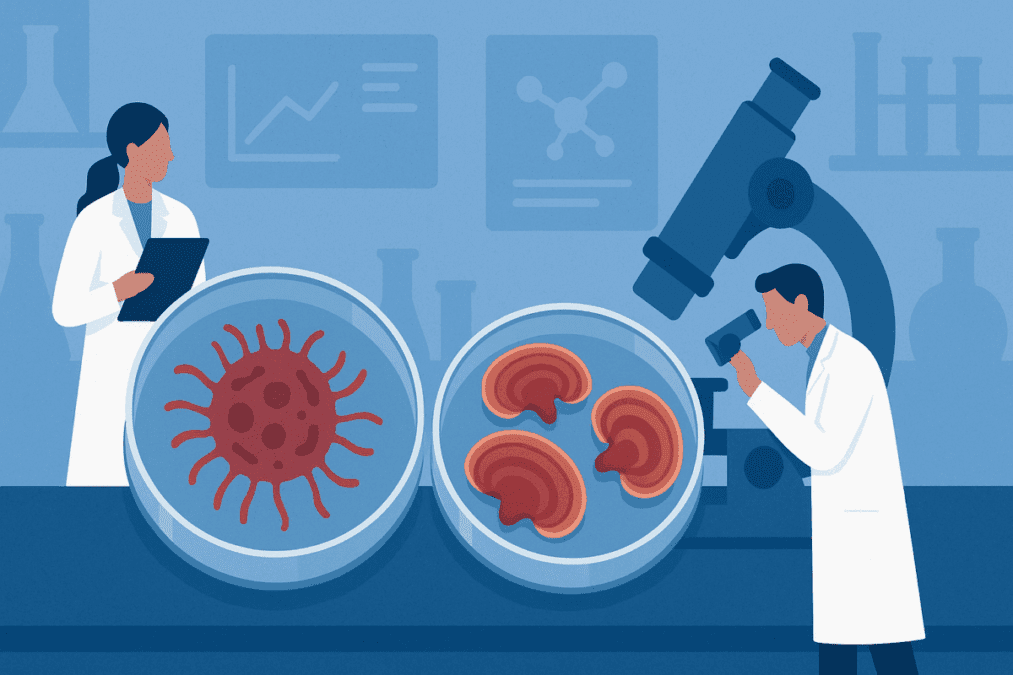
Challenges and Limitations in Reishi Mushroom Cancer Research
Despite the encouraging findings, reishi mushroom cancer study research faces several challenges that must be acknowledged to maintain scientific rigor and credibility. One major limitation is the variability in reishi products used in studies. Differences in species, cultivation methods, extraction processes, and dosages can all impact the outcomes, making it difficult to standardize results.
Moreover, many studies are preclinical or involve small sample sizes, limiting the generalizability of findings. Larger, multicenter clinical trials are urgently needed to confirm the preliminary benefits observed in smaller studies. Additionally, the placebo effect, which can be substantial in oncology trials, must be carefully accounted for through robust study designs.
Another challenge is the complexity of cancer itself. Cancer is not a single disease but a group of heterogeneous conditions, each with distinct genetic, molecular, and environmental factors. Therefore, it is unlikely that a single natural product like reishi would offer a universal benefit across all cancer types. Future research must adopt a more personalized approach, identifying which cancers and which patients are most likely to respond to reishi-based interventions.
Finally, regulatory issues and quality control concerns about dietary supplements add another layer of complexity. Without strict oversight, product purity, potency, and authenticity can vary, posing potential risks to consumers.
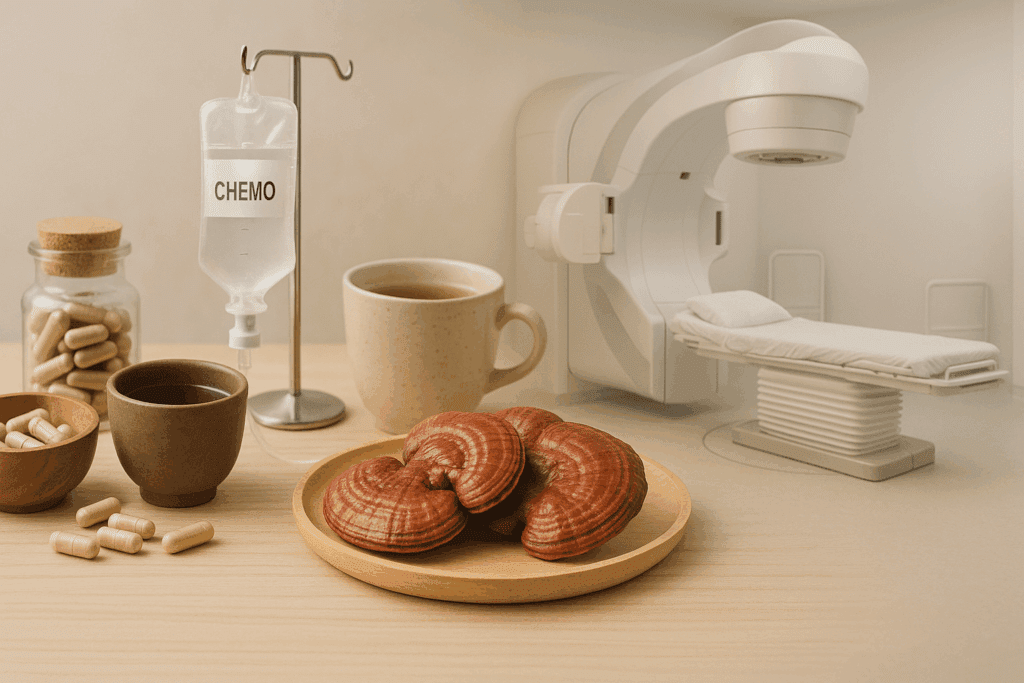
FAQ: Advanced Insights into Reishi Mushroom and Cancer Research
1. How has the focus of reishi mushroom cancer study evolved in recent years?
Recent reishi mushroom cancer study efforts have shifted from simply observing anti-tumor activity to exploring how specific bioactive compounds like triterpenoids and beta-glucans interact with cancer cell pathways. Earlier research mainly described general immune-boosting effects. Now, studies are isolating exact molecular targets, such as the inhibition of VEGF-mediated angiogenesis (the formation of new blood vessels that tumors need to grow). The evolution of reishi TCM (Traditional Chinese Medicine) into molecular oncology research reflects broader scientific acceptance. This marks a significant step toward integrating reishi into evidence-based complementary cancer care.
2. What distinguishes the lingzhi mushroom and cancer research in Asia from that conducted in the West?
In Asia, particularly China, Japan, and Korea, research on lingzhi mushroom and cancer tends to emphasize holistic mechanisms—such as improving life energy (“Qi”)—alongside measurable biological markers. Western research often seeks quantifiable outcomes like tumor size reduction or immune cell counts. However, Asian studies under reishi TCM frameworks often explore quality-of-life improvements and psychoemotional well-being, dimensions frequently overlooked in Western models. This dual approach shows how lingzhi mushroom and cancer studies are not only about survival rates but about the experience of healing, suggesting areas where Western methodologies could broaden their scope.
3. Can ganoderma mushroom cancer research inform immunotherapy advancements?
Absolutely. Ganoderma mushroom cancer investigations have revealed that its polysaccharides can enhance dendritic cell maturation and T-cell activation, key components of modern immunotherapy. These findings are exciting because they suggest that natural compounds could serve as adjuncts to enhance immune checkpoint inhibitors or CAR-T cell therapies. Unlike synthetic adjuvants, ganoderma mushroom cancer compounds may offer lower toxicity profiles. Several reishi mushroom cancer study projects are currently exploring how these natural compounds can “train” the immune system more gently but effectively, possibly making aggressive treatments more tolerable.
4. How does reishi TCM usage inform complementary cancer treatment strategies today?
The long history of reishi TCM offers a rich foundation for designing supportive cancer therapies. In clinical settings, reishi is often used to mitigate chemotherapy side effects like fatigue, nausea, and low white blood cell counts. Emerging protocols blend traditional reishi TCM wisdom with modern pharmacology to personalize supplementation according to a patient’s constitution and treatment phase. This fusion reflects a broader trend: integrating natural therapies like lingzhi mushroom and cancer support programs within major hospital systems, especially in integrative oncology centers.
5. What are some innovative delivery methods being tested in reishi mushroom cancer study trials?
New technologies are enhancing how reishi compounds are delivered to patients. Nanoparticle encapsulation, for instance, is being explored to improve bioavailability and targeted delivery in ganoderma mushroom cancer research. Traditional reishi TCM preparations like teas or powders often suffer from inconsistent absorption rates. Novel forms such as liposomal extracts, slow-release tablets, and injectable polysaccharide solutions are showing promise in preclinical studies. These delivery innovations could make lingzhi mushroom and cancer therapies more standardized, potent, and clinically useful in the near future.
6. Why is standardization so critical in lingzhi mushroom and cancer research?
Unlike synthetic drugs, natural products like reishi can vary greatly depending on species, growing conditions, and extraction methods. Inconsistent potency has long plagued reishi mushroom cancer study results, making comparisons difficult. Standardizing ganoderma mushroom cancer extracts—particularly their triterpenoid and beta-glucan content—is crucial for creating reproducible, reliable data. Advances in DNA barcoding and metabolomics are helping scientists ensure that each study uses chemically equivalent reishi materials, raising the credibility of both reishi TCM practitioners and Western clinical researchers.
7. What psychological benefits are associated with reishi use in cancer patients?
Several lingzhi mushroom and cancer trials have observed that patients report improved mood, reduced anxiety, and better sleep when taking reishi supplements alongside conventional treatment. While the physiological mechanisms (like reduced cortisol levels) are under investigation, these findings underscore reishi TCM’s traditional reputation as a “shen” (spirit) tonic. Helping a patient feel calmer and more resilient may not shrink tumors directly, but psychological resilience can profoundly affect treatment outcomes and overall prognosis. Thus, the ganoderma mushroom cancer research community is increasingly advocating for holistic endpoints in trials.
8. How are personalized medicine approaches shaping reishi mushroom cancer study designs?
Personalized medicine is revolutionizing how reishi mushroom cancer study protocols are built. Instead of using a one-size-fits-all dosage, researchers are now tailoring reishi supplementation based on genetic profiles, metabolic rates, and immune status. This mirrors ancient reishi TCM practices, where practitioners would adjust prescriptions based on individual constitution. Modern tools like biomarker profiling enable even finer customization, potentially making lingzhi mushroom and cancer interventions more precise and impactful than ever before.
9. Are there any risks associated with integrating ganoderma mushroom cancer supplements during chemotherapy?
While reishi generally has a strong safety profile, combining it with chemotherapy should be done cautiously. Some bioactive compounds could theoretically influence drug metabolism via cytochrome P450 pathways. A few reishi mushroom cancer study reports have suggested that very high doses might either potentiate or inhibit the effects of certain chemotherapy drugs. This is why consultation with an oncologist familiar with reishi TCM and pharmacokinetics is crucial. Personalized oversight ensures that lingzhi mushroom and cancer strategies support, rather than interfere with, primary cancer treatments.
10. What future directions look promising for research on reishi and cancer?
The future of ganoderma mushroom cancer research lies in systems biology and AI-assisted drug discovery. Scientists are using machine learning models to predict how complex reishi compounds might synergize with other natural or pharmaceutical agents. Multi-omics studies integrating genomics, proteomics, and metabolomics could uncover hidden networks where reishi acts, moving beyond simple “boosts immunity” narratives. The next frontier may even involve creating synthetic analogs of key reishi molecules, based on insights drawn from traditional reishi TCM usage combined with cutting-edge biotechnology. As a result, lingzhi mushroom and cancer treatments could soon become more refined, potent, and globally accepted.
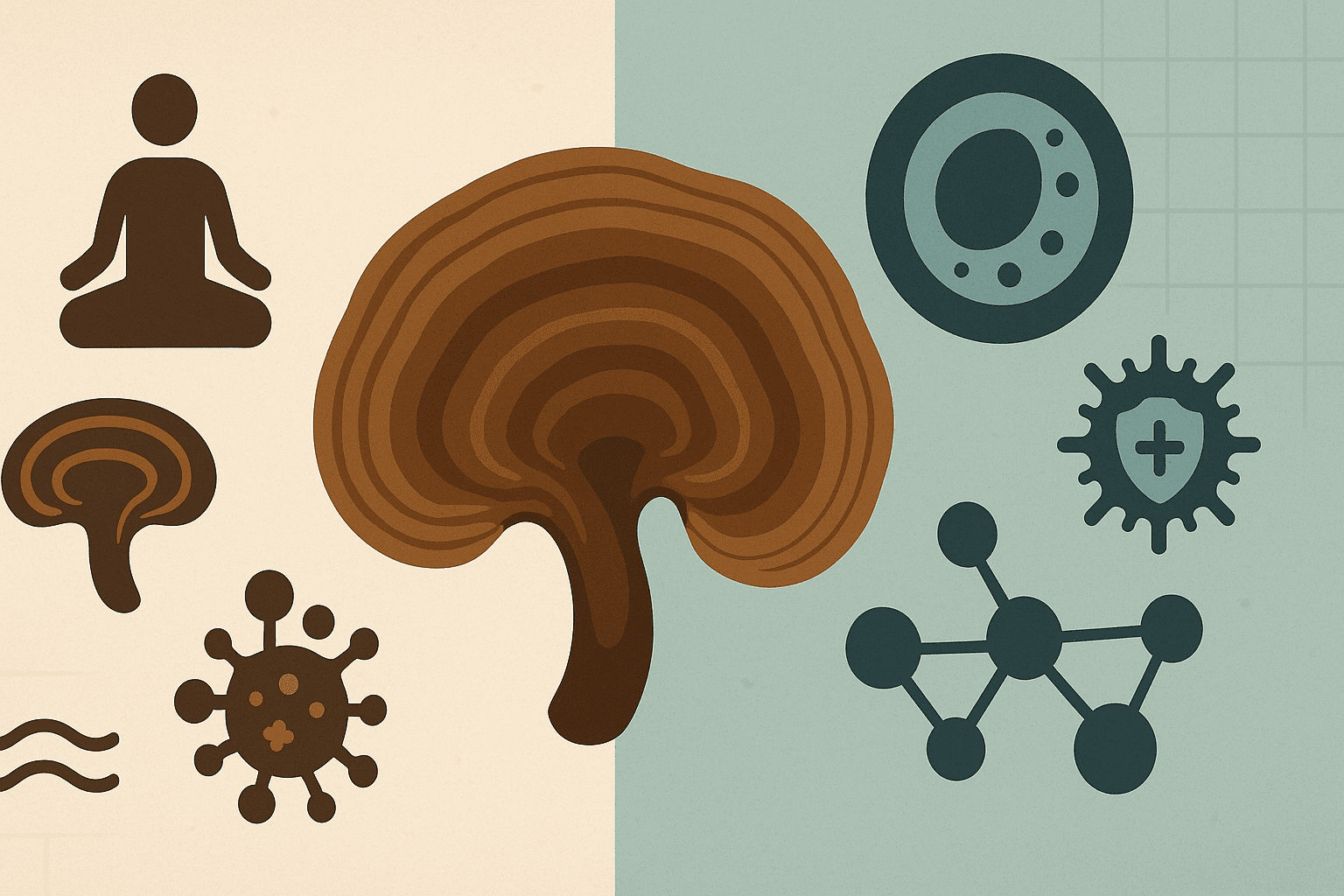
Conclusion: Reishi’s Emerging Role in Cancer Support and Future Directions
The intersection of reishi TCM traditions and modern scientific inquiry paints a compelling, though cautious, picture of reishi’s potential role in integrative cancer support. Insights gleaned from reishi mushroom cancer study investigations offer hopeful avenues for enhancing immune function, mitigating treatment side effects, and possibly augmenting conventional therapies. While lingzhi mushroom and cancer discussions in ancient TCM emphasized preventive health and vitality, today’s ganoderma mushroom cancer research seeks to translate those ancient observations into evidence-based strategies for contemporary medicine.
As our understanding deepens, it becomes increasingly clear that reishi is not a magic bullet but may serve as a valuable ally in the broader context of holistic cancer care. Embracing both the wisdom of reishi TCM traditions and the rigor of modern science will be key to unlocking its full potential. Continued investment in high-quality research, patient education, and clinical collaboration will determine how reishi ultimately fits into the evolving landscape of cancer support therapies. For now, the journey between ancient mushrooms and cutting-edge medicine offers both inspiration and a call for thoughtful, evidence-based exploration.
Further Reading:
Exploring the Therapeutic Potential of Ganoderma lucidum in Cancer
Ganoderma lucidum (Reishi mushroom) for cancer treatment
Was this article helpful? Don’t let it stop with you. Share it right now with someone who needs to see it—whether it’s a friend, a colleague, or your whole network. And if staying ahead on this topic matters to you, subscribe to this publication for the most up-to-date information. You’ll get the latest insights delivered straight to you—no searching, no missing out.
.Important Note: The information contained in this article is for general informational purposes only, and should not be construed as health or medical advice, nor is it intended to diagnose, prevent, treat, or cure any disease or health condition. Before embarking on any diet, fitness regimen, or program of nutritional supplementation, it is advisable to consult your healthcare professional in order to determine its safety and probable efficacy in terms of your individual state of health.
Regarding Nutritional Supplements Or Other Non-Prescription Health Products: If any nutritional supplements or other non-prescription health products are mentioned in the foregoing article, any claims or statements made about them have not been evaluated by the U.S. Food and Drug Administration, and such nutritional supplements or other health products are not intended to diagnose, treat, cure, or prevent any disease.


